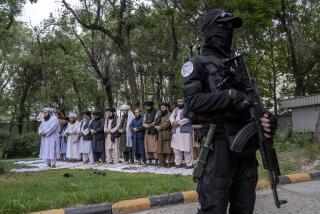Mediators Seek Truce Between Afghan Tribes
TASHQURGHAN, Afghanistan — Mediators shuttled between Uzbek and Tajik commanders Monday trying to hammer out a truce after a factional clash killed eight people and wounded 30 in this northern Afghan town.
The fighting poked a hole in the paper-thin sense of peace here and raised tensions between the region’s most powerful warlords, the same ones who had fought together as members of the Northern Alliance.
“When we had to face one enemy, we did fine,” said Gholam Sakhi Mourtazar, a police commissioner and one of the mediators. “But now the bigger groups want all the power and the rest of us to disappear. It’s like the old days.”
Ata Mohammed, the leading Tajik warlord, dismissed such talk with the wave of a hand.
“What we had was just a little problem between local leaders, nothing bigger,” he said.
It’s not clear what sparked the fighting, which took place Saturday and Sunday 25 miles east of Mazar-i-Sharif. Some said it was the defection of commanders from one warlord to another. Others blamed tensions over disarmament.
Another explanation centered on a local commander who allegedly stole sheep and shot a dog.
Whatever the cause, the Tashqurghan melee marked the deepest fissure yet within the Northern Alliance, the U.S.-backed coalition that launched the rout of the Taliban regime last fall. There have been sporadic battles in other areas of Afghanistan since the Taliban collapsed. But not until last weekend have large numbers of alliance troops unleashed their considerable firepower on one another.
Shells sailed over the town’s market, machine-gun fire ripped through stalls selling raisins, spices, saddles and cloth, and a local employee of an aid organization was killed by a stray bullet.
Witnesses said U.S. Special Forces soldiers who have been providing protection for leaders of three main alliance factions were nearly caught in the cross-fire.
Several U.S. soldiers interviewed in Mazar-i-Sharif said they weren’t allowed to talk about the incident.
The clash came at a time when a new police force in Mazar-i-Sharif has been trying to trim the number of armed men on the streets and install a sense of order. Weapons checks at city limits have helped. But hundreds of gunmen still stroll around the city, and there’s a growing disillusionment with the interim government in Kabul.
Different factions tell different stories about the trouble in Tashqurghan, a town on the edge of a steppe where farmers shop for supplies and nomads bring their camels for water.
According to Tajik leaders, Uzbek troops attacked their positions after three commanders from the Uzbek-led Jambish party defected to the Tajik-led Jamiat party. Northern Afghanistan is dominated by three ethnic groups--Tajiks, Uzbeks and Hazaras--and each has a political party and a militia. Towns often are divided among the groups’ militias.
Uzbek authorities said the fighting was the fault of a local commander who resisted efforts to keep armed men out of population centers. That commander, named Kabir, seemed to have disappeared, and none of the Uzbek authorities knew where to find him.
Hazara leaders, who historically have enjoyed a modicum of neutrality, said the Tajiks were trying to consolidate power across northern Afghanistan by bribing commanders to join their side.
Zainullah, one of the commanders who defected to the Tajiks, said he was not pressured to switch.
“My Jambish leader was a sheep thief,” he said. “It was a dishonor to be with him.”
He added that his leader had stolen many things from Tashqurghan residents and even shot his own dog as he was leaving town.
For the last week, tensions had been rising here, locals said, as Tajik and Uzbek forces began to wheel heavy weaponry into town, including Soviet-made missile batteries. On Saturday, Gen. Abdul Rashid Dostum, the leading warlord in the north and an ethnic Uzbek, dispatched an emissary to negotiate with the Tajik troops.
The talks went nowhere, and, as Dostum’s emissary was driving off, gunfire erupted.
The battle ended Sunday afternoon when the more numerous Tajiks surrounded the Uzbek garrison, forcing the Uzbeks to flee.
On Monday, mediator Mourtazar, a Hazara, met with Uzbek leaders and tried to persuade them not to send new troops to Tashqurghan.
“All the people here want is quiet,” he said. “Is that too much?”
More to Read
Sign up for Essential California
The most important California stories and recommendations in your inbox every morning.
You may occasionally receive promotional content from the Los Angeles Times.










